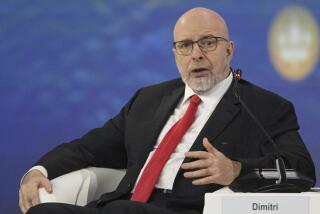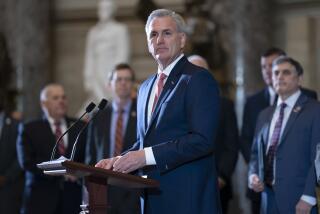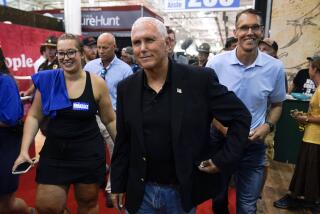Prosecutors suspected Manafort was a ‘back channel’ between Trump campaign and Russia
Reporting from Washington — Paul Manafort, President Trump’s former campaign chairman, came under scrutiny by the special counsel because prosecutors suspected he might be a back channel between the Trump campaign and Russian efforts to interfere in the U.S. election, a Justice Department lawyer said Thursday.
The disclosure came as lawyers for Manafort tried to convince a federal judge to throw out one of two federal cases against him, arguing that special counsel Robert S. Mueller III had no authority to hit him with criminal charges unrelated to the Russian meddling.
An attorney for Mueller’s office, Michael Dreeben, told the court that the prosecution of Manafort’s alleged financial crimes arose because Manafort had “long-standing ties” to Russians, and investigators wanted to know if those connections provided a “back channel to Russia.”
“An investigation will naturally look at these things,” he said.
Manafort, once a prominent Washington lobbyist and Republican power broker, was indicted in Washington and Virginia after he declined a government offer to have the cases combined. He has pleaded not guilty to nearly two dozen charges of money laundering, tax evasion and bank fraud.
Manafort’s lawyers say the Justice Department memo appointing Mueller last May didn’t authorize a wide-ranging pursuit of other crimes. They want the government to release other communications between Mueller and Deputy Atty. Gen. Rod Rosenstein, who made the appointment and is continuing to supervise Mueller’s work.
“I think we’re entitled to see the record,” said Manafort’s attorney, Kevin Downing. He said Mueller did not have a “blank check.”
U.S. District Judge Amy Berman Jackson did not make an immediate ruling, but she pressed Manafort’s attorneys to explain why they thought Mueller’s power to prosecute crimes was limited.
Rosenstein’s initial memo gave Mueller authority to investigate “any links and/or coordination between the Russian government and individuals associated with the campaign of President Donald Trump,” along with “any matters that arose or may arise directly from the investigation.”
Rosenstein has allowed Mueller to aggressively expand the investigation and pursue other crimes, in the process becoming the target of vehement attacks from Trump and his supporters.
In August, after the FBI already had raided Manafort’s home in Virginia with a court-approved search warrant, Rosenstein wrote a follow-up memo. It specified that the special counsel could pursue crimes that arose from Manafort’s lobbying work in the Ukraine for pro-Kremlin politicians before he joined the Trump campaign.
It’s that work, and the tens of millions of dollars that flowed from it, that formed the basis for the criminal charges against Manafort and his former deputy, Richard Gates. Gates subsequently pleaded guilty to two charges in a plea deal and agreed to cooperate with prosecutors.
“Mr. Manafort’s work in the Ukraine has nothing to do with the campaign, or any collusion with the Russian government,” Downing said.
In separate motions, Manafort’s attorneys also moved to attack individual charges that he lied about his Ukraine work and failed to properly register as a foreign agent.
Manafort’s attorneys argue that two of the counts amount to the same thing, and they argue that Mueller has improperly stretched the meaning of the Foreign Agent Registration Act.
Manafort is scheduled to face trial in September in Virginia unless he succeeds in getting the case tossed out. His trial in Washington is scheduled for September.
Twitter: @jtanfani
More to Read
Get the L.A. Times Politics newsletter
Deeply reported insights into legislation, politics and policy from Sacramento, Washington and beyond. In your inbox three times per week.
You may occasionally receive promotional content from the Los Angeles Times.











